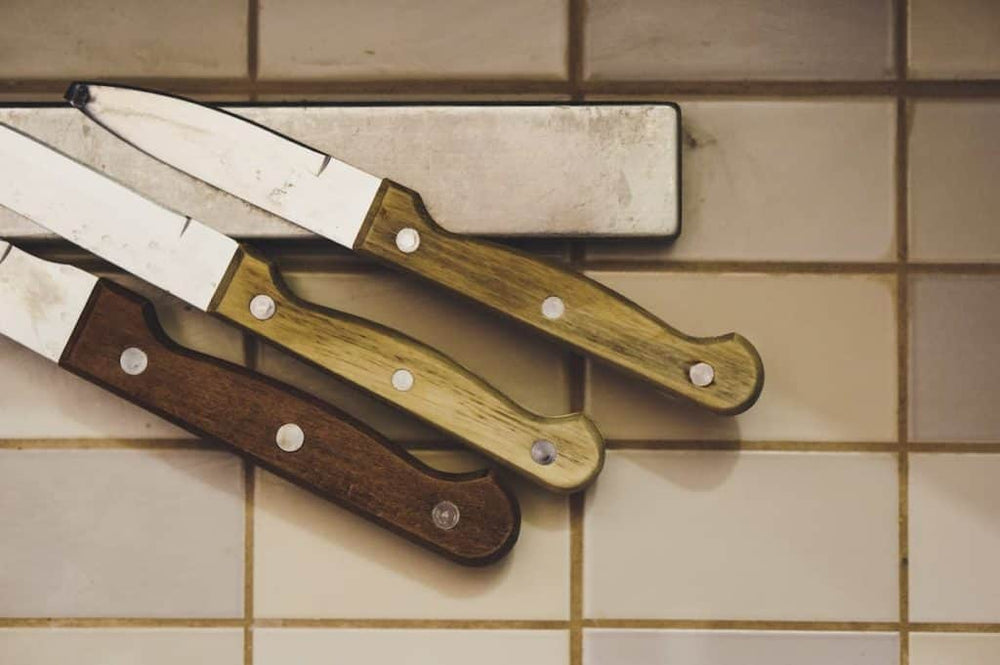Your Cart is Empty
Free US Shipping
Free US Shipping
Proper storage is one of the most important aspects of owning a good knife. Keeping your knife loose in a drawer with other utensils is a good way to wear out the blade prematurely, and leaving it out on the counter is no good either. For these reasons, a decent knife drawer or knife block is usually indispensable in any kitchen.
Magnetic knife blocks use a strong magnetic strip to hold your knives in place, and they are not typically bad for knives. This provides a minimalistic and visually pleasing way to store your knives. However, there are some drawbacks to using magnetic knife holders.
Keep reading to see details on magnetic knife blocks and whether or not they are bad for your knives.
Different types of knife blocks have different pros and cons depending on the way in which the knives are stored. Different types of blocks and storage solutions can also take up room in your kitchen and present a safety hazard if used incorrectly.
Magnetic knife blocks use magnets to hold your knives in place. They usually take the form of a magnetic strip affixed to the wall of your kitchen, but vertical magnetic blocks that sit on the counter are also common. There are a number of advantages to using a magnetic knife block, and there could also be significant drawbacks depending on the quality of the design.
Magnetic knife blocks are good for storing your knives in a simple way that still allows them to stand out visually. However, they can present a safety hazard if the magnet is not strong enough. They can also degrade your knives if the magnetic strip is not cleaned properly.
Most kitchen knives are made from high chromium stainless steel. The chromium content allows the knife to endure wetness and food without rusting or spotting. However, high chromium stainless steels are also more prone to denting or bending compared to high-carbon steel used in combat or survival knives.
This means that the knife may dent or bend if it falls from the magnetic block. Falling can also present a safety hazard. However, these factors are usually not a problem if the magnet is strong enough.

On the other hand, a magnet that is too strong can cause stress on the tang of the knife when it is being removed from the magnetic holder.
As with any storage solution for knives, it is always important to make sure your knife is clean and dry before storing it. Leaving water or food soil on your knife can and will cause it to rust.
Regular honing with a honing rod or sharpening tool is also recommended to help the edge of the knife stay straight and sharp, regardless of how you choose to store it.
There are a few ways that magnetic knife blocks can affect the quality of your knives. As mentioned earlier, kitchen knives are usually composed of a high chromium stainless steel, which can be more prone to bending than other types of steel.
Magnetic knife blocks are not bad for your knives. However, low quality magnetic knife blocks may drop knives due to a weak magnet. They might also place unnecessary strain on the tang of the knife if the magnet is too strong.
If you do not clean your magnetic knife holder regularly, or you put your knives away dirty, then the particles may scratch your knife. A dirty magnetic holder might also have trouble holding knives in place. For these reasons, it is important to keep your knives and your knife block clean.
The last area of concern with a magnetic knife strip is the openness of the design. Children and animals that get rowdy around the kitchen could potentially knock your knives off of the magnetic strip, which creates a safety hazard.
If you have children or pets, it is best to make sure that the magnetic knife block is secure and out of reach. Alternatively, you can use a knife drawer or other more concealed storage solution.
Using a magnetic knife block is fairly simple. In fact, the simplicity of the design is one of the main selling points. As long as the magnetic strip is strong and firmly fixed in place, you should have no trouble using a magnetic knife block.

You can use a magnetic knife block by placing the knife blade on the magnetic strip. The magnet will grab the knife and hold it in place. If the block is affixed to the wall, it is recommended to place the knives with the blades pointing up so that they fall on the handle if they fall.
Some knives, such as ceramic knives, are not magnetic. This means they will not be usable with a magnetic knife block. Steel knives, however, are almost always made entirely from a ferromagnetic material and so can be used with a magnetic knife block without issue.
The most important concern with any knife-related product is safety. If you plan on purchasing a magnetic knife block, make sure that the design is robust and that the magnet is strong enough to hold your knives. Also, always pay attention to any safety recommendations and warnings that are noted in the product documentation.
Magnetic knife blocks provide an elegant and novel way to store your knives in an accessible and safe manner. However, there are a number of factors that are important to consider before using any kind of magnetic knife holder.
Safety is the main concern, and so it is important to make sure you get a magnetic block that is sufficiently strong enough to hold your knives in place. Installing the block in a safe and secure place is also important. Lastly, you should make sure that your knives are always clean and dry before putting them away.
